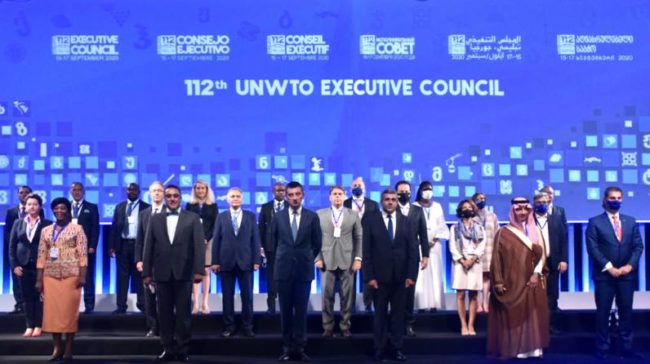
UNWTO Social Distancing Policy and Masks are a big NO
The UNWTO Executive Council met last week in Georgia. This was a controversial session not only because the event was conducted in Secretary-General Pololikashvil’s home country Georgia, but with a clear attempt to influence the re-election of the Secretary-General.
Another UN agency, the World Health Organization (WHO) established clear guidelines to limit the spread of COVID -19
They say one can reduce your chances of being infected or spreading COVID-19 by taking some simple precautions:
- Regularly and thoroughly clean your hands with an alcohol-based hand rub or wash them with soap and water. Why? Washing your hands with soap and water or using alcohol-based hand rub kills viruses that may be on your hands.
- Maintain at least 1 meter (3 feet) distance between yourself and others. Why? When someone coughs, sneezes, or speaks they spray small liquid droplets from their nose or mouth which may contain the virus. If you are too close, you can breathe in the droplets, including the COVID-19 virus if the person has the disease.
- Avoid going to crowded places. Why? Where people come together in crowds, you are more likely to come into close contact with someone that has COVID-19 and it is more difficult to maintain a physical distance of 1 meter (3 feet).
- Governments should encourage the general public to wear a fabric mask if there is widespread community transmission, and especially where physical distancing cannot be maintained. Why? Masks are a key tool in a comprehensive approach to the fight against COVID-19. For more public advice on masks, read our Q&A and watch our videos.”
- Avoid touching eyes, nose, and mouth. Why? Hands touch many surfaces and can pick up viruses. Once contaminated, hands can transfer the virus to your eyes, nose, or mouth. From there, the virus can enter your body and infect you.
- Make sure you, and the people around you, follow good respiratory hygiene. This means covering your mouth and nose with your bent elbow or tissue when you cough or sneeze. Then dispose of the used tissue immediately and wash your hands. Why? Droplets spread the virus. By following good respiratory hygiene, you protect the people around you from viruses such as cold, flu and COVID-19.
- Stay home and self-isolate even with minor symptoms such as cough, headache, mild fever, until you recover. Have someone bring you supplies. If you need to leave your house, wear a mask to avoid infecting others. Why? Avoiding contact with others will protect them from possible COVID-19 and other viruses.
- If you have a fever, cough, and difficulty breathing, seek medical attention, but call by telephone in advance if possible and follow the directions of your local health authority. Why? National and local authorities will have the most up to date information on the situation in your area. Calling in advance will allow your health care provider to quickly direct you to the right health facility. This will also protect you and help prevent the spread of viruses and other infections.
- Keep up to date on the latest information from trusted sources, such as WHO or your local and national health authorities. Why? Local and national authorities are best placed to advise on what people in your area should be doing to protect themselves.
UNWTO executive council backs a strong united plan for global tourism
According to the Embassy of Georgia in Spain, only citizens from 5 European countries can enter Georgia freely.
At this stage, the state border of Georgia is open to 5 countries (Germany, France, Estonia, Latvia, and Lithuania) out of 27 EU member states, on the condition that upon arrival to Georgia citizens of this country submit a PCR test result taken within the last 72 hours, or undergo PCR testing at their own expense in a laboratory located at the airport
Before elected Secretary-General Pololikashvil was the Ambassador for Georgia in Spain and managed to arrange for the executive committee meeting in Tbilisi.
Prior to the Executive Council session, widespread concerns had already been raised why it was necessary to hold the meeting in Georgia in the middle of the COVID-19 Pandemic instead of organizing the Executive Council online like the UN General Assembly currently being held.
Many Executive Council Members wisely decided not to travel to Georgia.
Those who did, took a certain risk, meeting with participants from countries with high COVID-19 infection rates. In particular the participants that came from Spain, both UNWTO staff and delegations traveling from and via Spain on a plane specifically chartered to bring them to the Council meeting in Georgia, posed a risk to the event. Spain is a COVID-19 hotspot at this time.
The photos on the UNWTO social media accounts showed the UNWTO Secretary-General Pololikashvili interacting with Executive Council participants, often standing amazingly close to each other.
Especially the group photo taken with all participants is embarrassing, taking into account that no one is wearing masks and all social distancing recommendations and measures issued by the World Health Organizations and most Governments are being ignored.
More than 70 participants surround the UNWTO Secretary-General Pololikashvili, standing closely next to each other on the group photo.
Such examples may undermine the hard work done by the World Health Organization to try to curb the spread of the COVID-19 virus.
If the United Nations World Tourism Organization disrespects social distancing measures, how can other UN Agencies, in particular the World Health Organization, be taken seriously when stressing the need for social distancing?
Reopening the travel and tourism industry relies on UNWTO to act responsibly and as an example. Some may argue pulling off this physical event is a good example and a message to the world that tourism is relaunching.
Disrespecting simple social distancing and mask rules should be seen however as irresponsible.
CATEGORIES news
